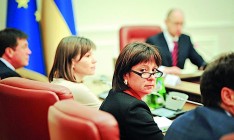Finance
national financeDisputes over the tax reform are an obstacle to the adoption of the national budget for 2015

Two weeks are left before the end of 2014, while there is still no final version of the national budget for 2015. Last Friday the Cabinet of Ministers registered a draft of the national budget 2015 in the Verkhovna Rada. However, on the following day the document was withdrawn from the parliament. The decision on withdrawal of the draft for revision was approved based on the results of Friday’s meeting of the leaders of the coalition factions with the premier and minister of finance. “We are in the middle of the process (of formation of the draft law on the national budget – Capital) within the framework of the government and coalition. We are holding brainstorming sessions and discussions on budget revenues and expenditures. We have not yet completed the discussions, which is why the final version of the draft has not yet been approved,” Finance Minister Natalie Jaresko wrote on Sunday on her Facebook page.
The draft of the national budget proposed on Friday (which Capital has a copy of) was calculated based on the forecast of a decrease of real GDP by 4.5%, nominal GDP in the amount of UAH 1.72 trl and a 13.4% rate of inflation, which former Deputy Finance Minister Denys Fudashkin announced earlier, when the former government was still in office. The document envisaged a 14.4% increase in revenues to UAH 432.3 bn compared to the national budget of 2014 and expenditures – by 9.9% to UAH 485.3 bn.
Its marginal deficit should have been UAH 65.1 bn or 3.8% of the GDP. The document thus met both pessimistic macro forecasts and deficit requirements of the International Monetary Fund envisaged in the revised stand-by arrangement at the end of August. Its adoption, however, turned out to be at risk of failure, because the parliamentarians were dissatisfied with the tax reform used as the basis for drafting the budget.
Code of discord
The new draft of the tax reform drawn up by the Cabinet, just as its previous version in October (Capital has copies of both documents) was not received well by people’s deputies due to the increase of the tax burden, which was supposed to ensure an increase in tax proceeds to the national budget 2015 by 16.5% or UAH 49.4 bn compared to the budget of 2014.
In particular, in the proposed concept the State Fiscal Service insists on introduction of the electronic administration of the VAT, while under the coalition agreement it must be cancelled. “The SFS does not want to cancel electronic administration completely, since it already spent time preparing the normative base and money for the purchase of the necessary equipment,” says Head of the Secretariat of the Entrepreneurs’ Council under the Cabinet of Ministers Andriy Zablovskiy.
The SFS proposes a transition period in January-March. Over this period fines will not be exacted for late registration of VAT invoices, provided that the delay is no more than 10 days. It will also be possible to register the invoice in the Common Register without any limitations. The SFS also agreed to the right for automatic VAT refunds only for those taxpayers, whose net fixed assets exceed the amount of the VAT refund by three times and whose investments into fixed assets were no less than UAH 3 mn over the past 12 months. Now, these companies will be eligible to receive an automatic VAT refund if they obtain a financial guarantee of one of the banks authorized by the government for the term of one year.
The draft of the reform contains also many other norms that were criticized by the representatives of businesses and people’s deputies. One of them is an increase of the rent for the use of subsoil for the production of gas for industry from 28% to 55%. Such a step, according to the calculations of the Ministry of Finance, would ensure UAH 30 bn for the national budget instead of UAH 20.4 bn envisaged this year.
The Ministry of Finance also proposes to expand the progressive taxation of the personal income tax (PIT). At the moment, the PIT for incomes up to 10 minimum wages (to date UAH 12,180) is 15% and 17% for the rest. After the scale of the tax is differentiated, the rates will be 15% for incomes up to UAH 12,500, 17% for incomes from UAH 12,500 to UAH 42,000, 20% for incomes from UAH 42,000 to UAH 83,000 and 25% for incomes that exceed this amount. Owing to this the government hopes to increase proceeds from the PIT from UAH 14.2 bn planned in the current budget to UAH 44.2 bn and compensate for the losses of proceeds from the corporate profit tax expected due to the continuing recession.
In search of a compromise
The approval of the draft of the national budget is being conducted parallel in several directions. After the withdrawal of the draft from the parliament the Cabinet’s press service specified that the meetings of the working groups have begun to finalize the changes in the tax and budget codes and the national budget for 2015, which will be drafted taking into account these changes.
In addition to that, the Ministry of Finance and specialized committees of the parliament are conducting consultations with IMF representatives who arrived with a new mission to Kyiv on December 9. In particular, on Saturday First Deputy Managing Director of the International Monetary Fund David Lipton met with heads of the economic bloc of the Cabinet – Natalie Jaresko and Minister of Economy Aivaras Abromavicius. The fund’s representatives also plan to meet with members of the VR Budget Committee, according to the committee’s chair Andriy Pavelko.
The Ministry of Finance is hoping to complete the work on amendments to the Tax Code and Budget Code and approve them in the Cabinet of Ministers this week. “Then, when this initial set of laws that determine the rules of drafting of the budget and decentralization of the budget process is approved by the parliament the ministry will draft the budget based on these laws,” said Jaresko. The parliamentarians expect that the draft of the national budget will be introduced for review by the Verkhovna Rada by December 26. Zablovskiy, however, believes that if the Cabinet and the deputies fail to reach a compromise on the reforms this week, it is possible that the budget process will be protracted to January with a 60% probability.











 of the agreement of syndication with Financial Times Limited are strictly prohibited. Use of materials which refers to France-Presse, Reuters, Interfax-Ukraine, Ukrainian News, UNIAN agencies is strictly prohibited. Materials marked
of the agreement of syndication with Financial Times Limited are strictly prohibited. Use of materials which refers to France-Presse, Reuters, Interfax-Ukraine, Ukrainian News, UNIAN agencies is strictly prohibited. Materials marked  are published as advertisements.
are published as advertisements.